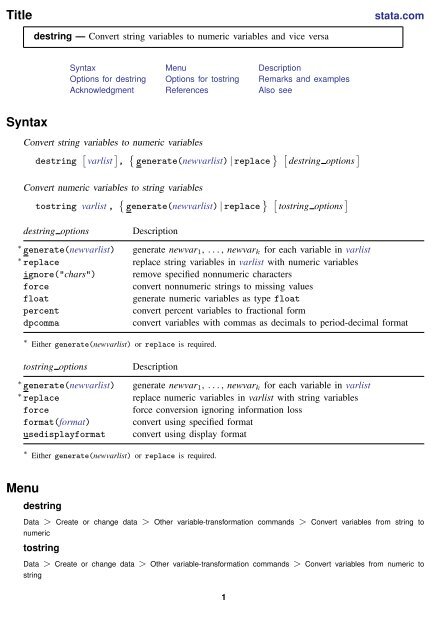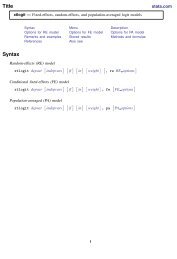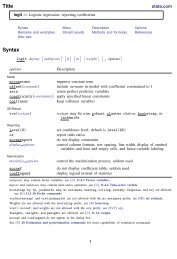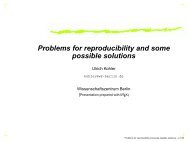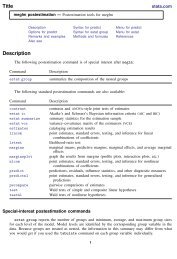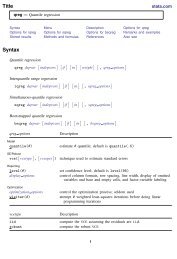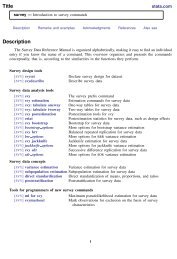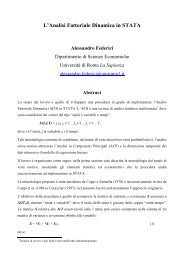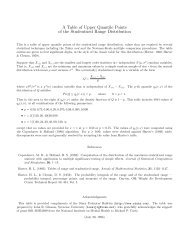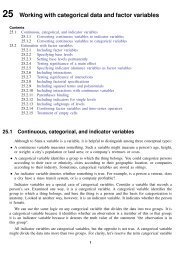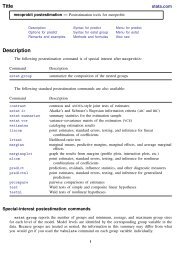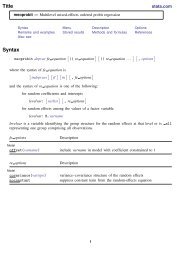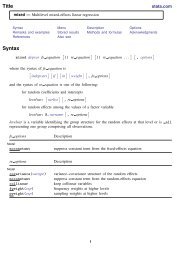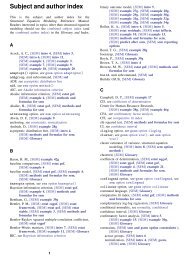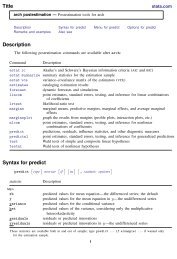destring - Stata
destring - Stata
destring - Stata
Create successful ePaper yourself
Turn your PDF publications into a flip-book with our unique Google optimized e-Paper software.
Title<br />
stata.com<br />
<strong>destring</strong> — Convert string variables to numeric variables and vice versa<br />
Syntax Menu Description<br />
Options for <strong>destring</strong> Options for tostring Remarks and examples<br />
Acknowledgment References Also see<br />
Syntax<br />
Convert string variables to numeric variables<br />
<strong>destring</strong> [ varlist ] , { generate(newvarlist) | replace } [ <strong>destring</strong> options ]<br />
Convert numeric variables to string variables<br />
tostring varlist , { generate(newvarlist) | replace } [ tostring options ]<br />
<strong>destring</strong> options<br />
∗ generate(newvarlist)<br />
∗ replace<br />
ignore("chars")<br />
force<br />
float<br />
percent<br />
dpcomma<br />
Description<br />
generate newvar 1 , . . . , newvar k for each variable in varlist<br />
replace string variables in varlist with numeric variables<br />
remove specified nonnumeric characters<br />
convert nonnumeric strings to missing values<br />
generate numeric variables as type float<br />
convert percent variables to fractional form<br />
convert variables with commas as decimals to period-decimal format<br />
∗ Either generate(newvarlist) or replace is required.<br />
tostring options<br />
∗ generate(newvarlist)<br />
∗ replace<br />
force<br />
format(format)<br />
usedisplayformat<br />
Description<br />
generate newvar 1 , . . . , newvar k for each variable in varlist<br />
replace numeric variables in varlist with string variables<br />
force conversion ignoring information loss<br />
convert using specified format<br />
convert using display format<br />
∗ Either generate(newvarlist) or replace is required.<br />
Menu<br />
<strong>destring</strong><br />
Data > Create or change data > Other variable-transformation commands > Convert variables from string to<br />
numeric<br />
tostring<br />
Data > Create or change data > Other variable-transformation commands > Convert variables from numeric to<br />
string<br />
1
2 <strong>destring</strong> — Convert string variables to numeric variables and vice versa<br />
Description<br />
<strong>destring</strong> converts variables in varlist from string to numeric. If varlist is not specified, <strong>destring</strong><br />
will attempt to convert all variables in the dataset from string to numeric. Characters listed in ignore()<br />
are removed. Variables in varlist that are already numeric will not be changed. <strong>destring</strong> treats both<br />
empty strings “ ” and “.” as indicating sysmiss (.) and interprets the strings “.a”, “.b”, . . . , “.z” as<br />
the extended missing values .a, .b, . . . , .z; see [U] 12.2.1 Missing values. <strong>destring</strong> also ignores<br />
any leading or trailing spaces so that, for example, “ ” is equivalent to “ ” and “ . ” is equivalent to<br />
“.”.<br />
tostring converts variables in varlist from numeric to string. The most compact string format<br />
possible is used. Variables in varlist that are already string will not be converted.<br />
Options for <strong>destring</strong><br />
Either generate() or replace must be specified. With either option, if any string variable<br />
contains nonnumeric characters not specified with ignore(), then no corresponding variable will be<br />
generated, nor will that variable be replaced (unless force is specified).<br />
generate(newvarlist) specifies that a new variable be created for each variable in varlist. newvarlist<br />
must contain the same number of new variable names as there are variables in varlist. If varlist is<br />
not specified, <strong>destring</strong> attempts to generate a numeric variable for each variable in the dataset;<br />
newvarlist must then contain the same number of new variable names as there are variables in the<br />
dataset. Any variable labels or characteristics will be copied to the new variables created.<br />
replace specifies that the variables in varlist be converted to numeric variables. If varlist is not<br />
specified, <strong>destring</strong> attempts to convert all variables from string to numeric. Any variable labels<br />
or characteristics will be retained.<br />
ignore("chars") specifies nonnumeric characters to be removed. If any string variable contains any<br />
nonnumeric characters other than those specified with ignore(), no action will take place for that<br />
variable unless force is also specified. Note that to <strong>Stata</strong> the comma is a nonnumeric character;<br />
see also the dpcomma option below.<br />
force specifies that any string values containing nonnumeric characters, in addition to any specified<br />
with ignore(), be treated as indicating missing numeric values.<br />
float specifies that any new numeric variables be created initially as type float. The default is type<br />
double; see [D] data types. <strong>destring</strong> attempts automatically to compress each new numeric<br />
variable after creation.<br />
percent removes any percent signs found in the values of a variable, and all values of that variable<br />
are divided by 100 to convert the values to fractional form. percent by itself implies that the<br />
percent sign, “ % ”, is an argument to ignore(), but the converse is not true.<br />
dpcomma specifies that variables with commas as decimal values should be converted to have periods<br />
as decimal values.<br />
Options for tostring<br />
Either generate() or replace must be specified. If converting any numeric variable to string<br />
would result in loss of information, no variable will be produced unless force is specified. For more<br />
details, see force below.
<strong>destring</strong> — Convert string variables to numeric variables and vice versa 3<br />
generate(newvarlist) specifies that a new variable be created for each variable in varlist. newvarlist<br />
must contain the same number of new variable names as there are variables in varlist. Any variable<br />
labels or characteristics will be copied to the new variables created.<br />
replace specifies that the variables in varlist be converted to string variables. Any variable labels<br />
or characteristics will be retained.<br />
force specifies that conversions be forced even if they entail loss of information. Loss of information<br />
means one of two circumstances: 1) The result of real(string(varname, "format")) is not<br />
equal to varname; that is, the conversion is not reversible without loss of information; 2) replace<br />
was specified, but a variable has associated value labels. In circumstance 1, it is usually best to<br />
specify usedisplayformat or format(). In circumstance 2, value labels will be ignored in a<br />
forced conversion. decode (see [D] encode) is the standard way to generate a string variable based<br />
on value labels.<br />
format(format) specifies that a numeric format be used as an argument to the string() function,<br />
which controls the conversion of the numeric variable to string. For example, a format of %7.2f<br />
specifies that numbers are to be rounded to two decimal places before conversion to string. See<br />
Remarks and examples below and [D] functions and [D] format. format() cannot be specified<br />
with usedisplayformat.<br />
usedisplayformat specifies that the current display format be used for each variable. For example,<br />
this option could be useful when using U.S. Social Security numbers or daily or other dates with<br />
some %d or %t format assigned. usedisplayformat cannot be specified with format().<br />
Remarks and examples<br />
Remarks are presented under the following headings:<br />
<strong>destring</strong><br />
tostring<br />
stata.com<br />
<strong>destring</strong><br />
Example 1<br />
We read in a dataset, but somehow all the variables were created as strings. The variables contain<br />
no nonnumeric characters, and we want to convert them all from string to numeric data types.<br />
. use http://www.stata-press.com/data/r13/<strong>destring</strong>1<br />
. describe<br />
Contains data from http://www.stata-press.com/data/r13/<strong>destring</strong>1.dta<br />
obs: 10<br />
vars: 5 3 Mar 2013 10:15<br />
size: 200<br />
storage display value<br />
variable name type format label variable label<br />
id str3 %9s<br />
num str3 %9s<br />
code str4 %9s<br />
total str5 %9s<br />
income str5 %9s<br />
Sorted by:
4 <strong>destring</strong> — Convert string variables to numeric variables and vice versa<br />
. list<br />
id num code total income<br />
1. 111 243 1234 543 23423<br />
2. 111 123 2345 67854 12654<br />
3. 111 234 3456 345 43658<br />
4. 222 345 4567 57 23546<br />
5. 333 456 5678 23 21432<br />
6. 333 567 6789 23465 12987<br />
7. 333 678 7890 65 9823<br />
8. 444 789 8976 23 32980<br />
9. 444 901 7654 23 18565<br />
10. 555 890 6543 423 19234<br />
. <strong>destring</strong>, replace<br />
id has all characters numeric; replaced as int<br />
num has all characters numeric; replaced as int<br />
code has all characters numeric; replaced as int<br />
total has all characters numeric; replaced as long<br />
income has all characters numeric; replaced as long<br />
. describe<br />
Contains data from http://www.stata-press.com/data/r13/<strong>destring</strong>1.dta<br />
obs: 10<br />
vars: 5 3 Mar 2013 10:15<br />
size: 140<br />
storage display value<br />
variable name type format label variable label<br />
id int %10.0g<br />
num int %10.0g<br />
code int %10.0g<br />
total long %10.0g<br />
income long %10.0g<br />
Sorted by:<br />
Note:<br />
. list<br />
dataset has changed since last saved<br />
id num code total income<br />
1. 111 243 1234 543 23423<br />
2. 111 123 2345 67854 12654<br />
3. 111 234 3456 345 43658<br />
4. 222 345 4567 57 23546<br />
5. 333 456 5678 23 21432<br />
6. 333 567 6789 23465 12987<br />
7. 333 678 7890 65 9823<br />
8. 444 789 8976 23 32980<br />
9. 444 901 7654 23 18565<br />
10. 555 890 6543 423 19234
<strong>destring</strong> — Convert string variables to numeric variables and vice versa 5<br />
Example 2<br />
Our dataset contains the variable date, which was accidentally recorded as a string because of<br />
spaces after the year and month. We want to remove the spaces. <strong>destring</strong> will convert it to numeric<br />
and remove the spaces.<br />
. use http://www.stata-press.com/data/r13/<strong>destring</strong>2, clear<br />
. describe date<br />
storage display value<br />
variable name type format label variable label<br />
date str14 %10s<br />
. list date<br />
date<br />
1. 1999 12 10<br />
2. 2000 07 08<br />
3. 1997 03 02<br />
4. 1999 09 00<br />
5. 1998 10 04<br />
6. 2000 03 28<br />
7. 2000 08 08<br />
8. 1997 10 20<br />
9. 1998 01 16<br />
10. 1999 11 12<br />
. <strong>destring</strong> date, replace ignore(" ")<br />
date: characters space removed; replaced as long<br />
. describe date<br />
storage display value<br />
variable name type format label variable label<br />
date long %10.0g<br />
. list date<br />
date<br />
1. 19991210<br />
2. 20000708<br />
3. 19970302<br />
4. 19990900<br />
5. 19981004<br />
6. 20000328<br />
7. 20000808<br />
8. 19971020<br />
9. 19980116<br />
10. 19991112<br />
Example 3<br />
Our dataset contains the variables date, price, and percent. These variables were accidentally<br />
read into <strong>Stata</strong> as string variables because they contain spaces, dollar signs, commas, and percent
6 <strong>destring</strong> — Convert string variables to numeric variables and vice versa<br />
signs. We want to remove all these characters and create new variables for date, price, and percent<br />
containing numeric values. After removing the percent sign, we want to convert the percent variable<br />
to decimal form.<br />
. use http://www.stata-press.com/data/r13/<strong>destring</strong>2, clear<br />
. describe<br />
Contains data from http://www.stata-press.com/data/r13/<strong>destring</strong>2.dta<br />
obs: 10<br />
vars: 3 3 Mar 2013 22:50<br />
size: 280<br />
storage display value<br />
variable name type format label variable label<br />
date str14 %10s<br />
price str11 %11s<br />
percent str3 %9s<br />
Sorted by:<br />
. list<br />
date price percent<br />
1. 1999 12 10 $2,343.68 34%<br />
2. 2000 07 08 $7,233.44 86%<br />
3. 1997 03 02 $12,442.89 12%<br />
4. 1999 09 00 $233,325.31 6%<br />
5. 1998 10 04 $1,549.23 76%<br />
6. 2000 03 28 $23,517.03 35%<br />
7. 2000 08 08 $2.43 69%<br />
8. 1997 10 20 $9,382.47 32%<br />
9. 1998 01 16 $289,209.32 45%<br />
10. 1999 11 12 $8,282.49 1%<br />
. <strong>destring</strong> date price percent, generate(date2 price2 percent2) ignore("$ ,%")<br />
> percent<br />
date: characters space removed; date2 generated as long<br />
price: characters $ , removed; price2 generated as double<br />
percent: characters % removed; percent2 generated as double<br />
. describe<br />
Contains data from http://www.stata-press.com/data/r13/<strong>destring</strong>2.dta<br />
obs: 10<br />
vars: 6 3 Mar 2013 22:50<br />
size: 480<br />
storage display value<br />
variable name type format label variable label<br />
date str14 %10s<br />
date2 long %10.0g<br />
price str11 %11s<br />
price2 double %10.0g<br />
percent str3 %9s<br />
percent2 double %10.0g<br />
Sorted by:<br />
Note:<br />
dataset has changed since last saved
<strong>destring</strong> — Convert string variables to numeric variables and vice versa 7<br />
. list<br />
date date2 price price2 percent percent2<br />
1. 1999 12 10 19991210 $2,343.68 2343.68 34% .34<br />
2. 2000 07 08 20000708 $7,233.44 7233.44 86% .86<br />
3. 1997 03 02 19970302 $12,442.89 12442.89 12% .12<br />
4. 1999 09 00 19990900 $233,325.31 233325.31 6% .06<br />
5. 1998 10 04 19981004 $1,549.23 1549.23 76% .76<br />
6. 2000 03 28 20000328 $23,517.03 23517.03 35% .35<br />
7. 2000 08 08 20000808 $2.43 2.43 69% .69<br />
8. 1997 10 20 19971020 $9,382.47 9382.47 32% .32<br />
9. 1998 01 16 19980116 $289,209.32 289209.32 45% .45<br />
10. 1999 11 12 19991112 $8,282.49 8282.49 1% .01<br />
tostring<br />
Conversion of numeric data to string equivalents can be problematic. <strong>Stata</strong>, like most software,<br />
holds numeric data to finite precision and in binary form. See the discussion in [U] 13.11 Precision<br />
and problems therein. If no format() is specified, tostring uses the format %12.0g. This format<br />
is, in particular, sufficient to convert integers held as bytes, ints, or longs to string equivalent without<br />
loss of precision.<br />
However, users will often need to specify a format themselves, especially when the numeric data<br />
have fractional parts and for some reason a conversion to string is required.<br />
Example 4<br />
Our dataset contains a string month variable and numeric year and day variables. We want to<br />
convert the three variables to a %td date.<br />
. use http://www.stata-press.com/data/r13/tostring, clear<br />
. list<br />
id month day year<br />
1. 123456789 jan 10 2001<br />
2. 123456710 mar 20 2001<br />
3. 123456711 may 30 2001<br />
4. 123456712 jun 9 2001<br />
5. 123456713 oct 17 2001<br />
6. 123456714 nov 15 2001<br />
7. 123456715 dec 28 2001<br />
8. 123456716 apr 29 2001<br />
9. 123456717 mar 11 2001<br />
10. 123456718 jul 3 2001<br />
. tostring year day, replace<br />
year was float now str4<br />
day was float now str2<br />
. generate date = month + "/" + day + "/" + year<br />
. generate edate = date(date, "MDY")<br />
. format edate %td
8 <strong>destring</strong> — Convert string variables to numeric variables and vice versa<br />
. list<br />
id month day year date edate<br />
1. 123456789 jan 10 2001 jan/10/2001 10jan2001<br />
2. 123456710 mar 20 2001 mar/20/2001 20mar2001<br />
3. 123456711 may 30 2001 may/30/2001 30may2001<br />
4. 123456712 jun 9 2001 jun/9/2001 09jun2001<br />
5. 123456713 oct 17 2001 oct/17/2001 17oct2001<br />
6. 123456714 nov 15 2001 nov/15/2001 15nov2001<br />
7. 123456715 dec 28 2001 dec/28/2001 28dec2001<br />
8. 123456716 apr 29 2001 apr/29/2001 29apr2001<br />
9. 123456717 mar 11 2001 mar/11/2001 11mar2001<br />
10. 123456718 jul 3 2001 jul/3/2001 03jul2001<br />
Saved characteristics<br />
Each time the <strong>destring</strong> or tostring commands are issued, an entry is made in the characteristics<br />
list of each converted variable. You can type char list to view these characteristics.<br />
After example 3, we could use char list to find out what characters were removed by the<br />
<strong>destring</strong> command.<br />
. char list<br />
date2[<strong>destring</strong>]: Characters removed were: space<br />
price2[<strong>destring</strong>]: Characters removed were: $ ,<br />
percent2[<strong>destring</strong>]: Characters removed were: %<br />
Acknowledgment<br />
<strong>destring</strong> and tostring were originally written by Nicholas J. Cox of the Department of<br />
Geography at Durham University, UK, and coeditor of the <strong>Stata</strong> Journal.<br />
References<br />
Cox, N. J. 1999a. dm45.1: Changing string variables to numeric: Update. <strong>Stata</strong> Technical Bulletin 49: 2. Reprinted<br />
in <strong>Stata</strong> Technical Bulletin Reprints, vol. 9, p. 14. College Station, TX: <strong>Stata</strong> Press.<br />
. 1999b. dm45.2: Changing string variables to numeric: Correction. <strong>Stata</strong> Technical Bulletin 52: 2. Reprinted in<br />
<strong>Stata</strong> Technical Bulletin Reprints, vol. 9, p. 14. College Station, TX: <strong>Stata</strong> Press.<br />
. 2011. Speaking <strong>Stata</strong>: MMXI and all that: Handling Roman numerals within <strong>Stata</strong>. <strong>Stata</strong> Journal 11: 126–142.<br />
Cox, N. J., and W. W. Gould. 1997. dm45: Changing string variables to numeric. <strong>Stata</strong> Technical Bulletin 37: 4–6.<br />
Reprinted in <strong>Stata</strong> Technical Bulletin Reprints, vol. 7, pp. 34–37. College Station, TX: <strong>Stata</strong> Press.<br />
Cox, N. J., and J. B. Wernow. 2000a. dm80: Changing numeric variables to string. <strong>Stata</strong> Technical Bulletin 56: 8–12.<br />
Reprinted in <strong>Stata</strong> Technical Bulletin Reprints, vol. 10, pp. 24–28. College Station, TX: <strong>Stata</strong> Press.<br />
. 2000b. dm80.1: Update to changing numeric variables to string. <strong>Stata</strong> Technical Bulletin 57: 2. Reprinted in<br />
<strong>Stata</strong> Technical Bulletin Reprints, vol. 10, pp. 28–29. College Station, TX: <strong>Stata</strong> Press.
Also see<br />
<strong>destring</strong> — Convert string variables to numeric variables and vice versa 9<br />
[D] egen — Extensions to generate<br />
[D] encode — Encode string into numeric and vice versa<br />
[D] functions — Functions<br />
[D] generate — Create or change contents of variable<br />
[D] split — Split string variables into parts


